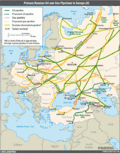Portal:Energy
| Main page | New articles & Tasks |
 The Energy Portal Welcome to Wikipedia's Energy portal, your gateway to energy. This portal is aimed at giving you access to all energy related topics in all of its forms.
|
Page contents: Selected article • Selected image • Selected biography • Did you know? • General images • Quotations • Related portals • Wikiprojects • Major topics • Categories • Help • Associated Wikimedia |
Introduction
Energy (from Ancient Greek ἐνέργεια (enérgeia) 'activity') is the quantitative property that is transferred to a body or to a physical system, recognizable in the performance of work and in the form of heat and light. Energy is a conserved quantity—the law of conservation of energy states that energy can be converted in form, but not created or destroyed. The unit of measurement for energy in the International System of Units (SI) is the joule (J).
Forms of energy include the kinetic energy of a moving object, the potential energy stored by an object (for instance due to its position in a field), the elastic energy stored in a solid object, chemical energy associated with chemical reactions, the radiant energy carried by electromagnetic radiation, the internal energy contained within a thermodynamic system, and rest energy associated with an object's rest mass. These are not mutually exclusive.
All living organisms constantly take in and release energy. The Earth's climate and ecosystems processes are driven primarily by radiant energy from the sun. The energy industry provides the energy required for human civilization to function, which it obtains from energy resources such as fossil fuels, nuclear fuel, and renewable energy. (Full article...)
Selected article
At about the same time, OPEC members agreed to use their leverage over the world price-setting mechanism for oil in order to quadruple world oil prices, after attempts at negotiation failed. Due to the dependence of the industrialized world on OPEC oil, these price increases were dramatically inflationary to the economies of the targeted countries, while at the same time suppressive of economic activity.
This increase in the price of oil had a dramatic effect on oil exporting nations, for the countries of the Middle East who had long been dominated by the industrial powers were seen to have acquired control of a vital commodity. The traditional flow of capital reversed as the oil exporting nations accumulated vast wealth. Meanwhile, the shock produced chaos in the West, and shares on the New York Stock Exchange lost $97 billion in value in six weeks.
Selected image

Photo credit: From an image by Wolfgang Beyer
Strombolian volcanic eruptions can eject incandescent cinder, lapilli and lava bombs to altitudes of tens to hundreds of meters.
Did you know?

- The 1,222 km long Nordstream pipeline between Russia and the Germany is the world's longest underwater pipeline?
- Due to the vast quantity of coal burnt in fossil fuel power plants, they cause more radioactive contamination than nuclear power plants?
- Chinese energy policy includes using renewable energy for the rural electrification of 3.5 million households by 2010?
- The 354 MW SEGS solar power plant (pictured) in the Mojave Desert is the world's largest?
- Known reserves of petroleum are typically estimated at around 1.2 trillion barrels, or at 3.74 trillion barrels if oil sands are included?
- The concentration of the greenhouse gas carbon dioxide has increased from about 280 parts per million to about 380 ppm since the start of the Industrial Revolution. That's an increase of 35.71%. The estimated population of the world in 1750 was 791 Million people. The estimated population of the world on June 30th, 2007 was 6.6 Billion people. That's an increase of 734.39%.?
- In the 1990s Bougainville conflict, islanders cut off from oil supplies due to a blockade used coconut oil to fuel their vehicles?
- The Organization of the Petroleum Exporting Countries (OPEC) is considered a cartel by many observers?
Selected biography
Maxwell studied natural philosophy, moral philosophy, and mental philosophy at the University of Edinburgh, before graduating in mathematics at the University of Cambridge, where he would conduct much of his career. He built on Michael Faraday's work on magnetic induction, using elements of geometry and algebra to demonstrate that electric and magnetic fields travel through space, in the form of waves, and at the constant speed of light. Finally, in 1861, Maxwell proposed that light consisted of undulations in the same medium that is the cause of electric and magnetic phenomena. In the same year he was elected to the Royal Society.
In 1864, Maxwell presented what are now known as Maxwell's equations to the Royal Society. These collectively describe the behaviour of both the electric and magnetic fields, as well as their interactions with matter.
In the news
- 13 June 2025 – Middle Eastern crisis
- Israeli decapitation strikes kill commander-in-chief of the Islamic Revolutionary Guard Corps Hossein Salami, senior nuclear scientist and former head of the Atomic Energy Organization of Iran Fereydoon Abbasi, and chief of the General Staff of the Armed Forces of the Islamic Republic of Iran Mohammad Bagheri and Quds Force commander Esmail Qaani. (The Times of Israel) (BBC News)
- 12 June 2025 – Nuclear program of Iran
- The International Atomic Energy Agency finds Iran in breach of its obligations to limit uranium enrichment and provision of information on its nuclear materials. (BBC News) (The Guardian)
- 6 June 2025 – Russian invasion of Ukraine
- Widespread power outages are reported in Ternopil after several cruise missiles hit energy infrastructure supplying the city. (Ukrinform)
- 29 May 2025 – Lliuya v RWE AG
- A court in Germany rejects a lawsuit filed by a Peruvian farmer against German energy firm RWE. Saúl Luciano Lliuya alleged that the firm's global emissions contributed to the melting of glaciers in Peru, threatening his hometown of Huaraz with flooding. (BBC News)
General images
Quotations
- "The world's second-largest emitter of greenhouse gases is China. Yet, China was entirely exempted from the requirements of the Kyoto Protocol. India and Germany are among the top emitters. Yet, India was also exempt from Kyoto." – George W. Bush, 2001
- "The newly industrialized States cannot, for example, be asked to apply restrictive environmental standards to their emerging industries unless the industrialized States first apply them within their own boundaries." – Pope John Paul II, 1990
- "We should work together to make sure the international community upholds the goals and framework established in the United Nations Framework Convention on Climate Change and its Kyoto Protocol and the principle of common but differentiated responsibilities." – Hu Jintao, 2007
Related portals
WikiProjects
WikiProjects connected with energy:
Other WikiProjects that may be of interest:
Major topics
Major categories
National energy supply, use & conservation
National electricity sector
Politics, economics, environment
- Climate change
- Energy conservation
- Energy economics
- Energy crises
- Energy development
- Energy policy
- Peak oil
Energy sources
- Fuels
- Biofuels
- Fossil fuels
- Fusion power
- Nuclear technology
- Renewable energy
- Energy conversion
- Electric power
- Energy storage
Energy-related design
Scientific usage
Help

Puzzled by energy?
Can't answer your question?
Don't understand the answer?
- Ask at the reference desk
- Read the Wikipedia help pages
For further ideas, to leave a comment, or to learn how you can help improve and update this portal, see the talk page.
Associated Wikimedia
The following Wikimedia Foundation sister projects provide more on this subject:
-
Commons
Free media repository -
Wikibooks
Free textbooks and manuals -
Wikidata
Free knowledge base -
Wikinews
Free-content news -
Wikiquote
Collection of quotations -
Wikisource
Free-content library -
Wikiversity
Free learning tools -
Wiktionary
Dictionary and thesaurus

























































































































































































